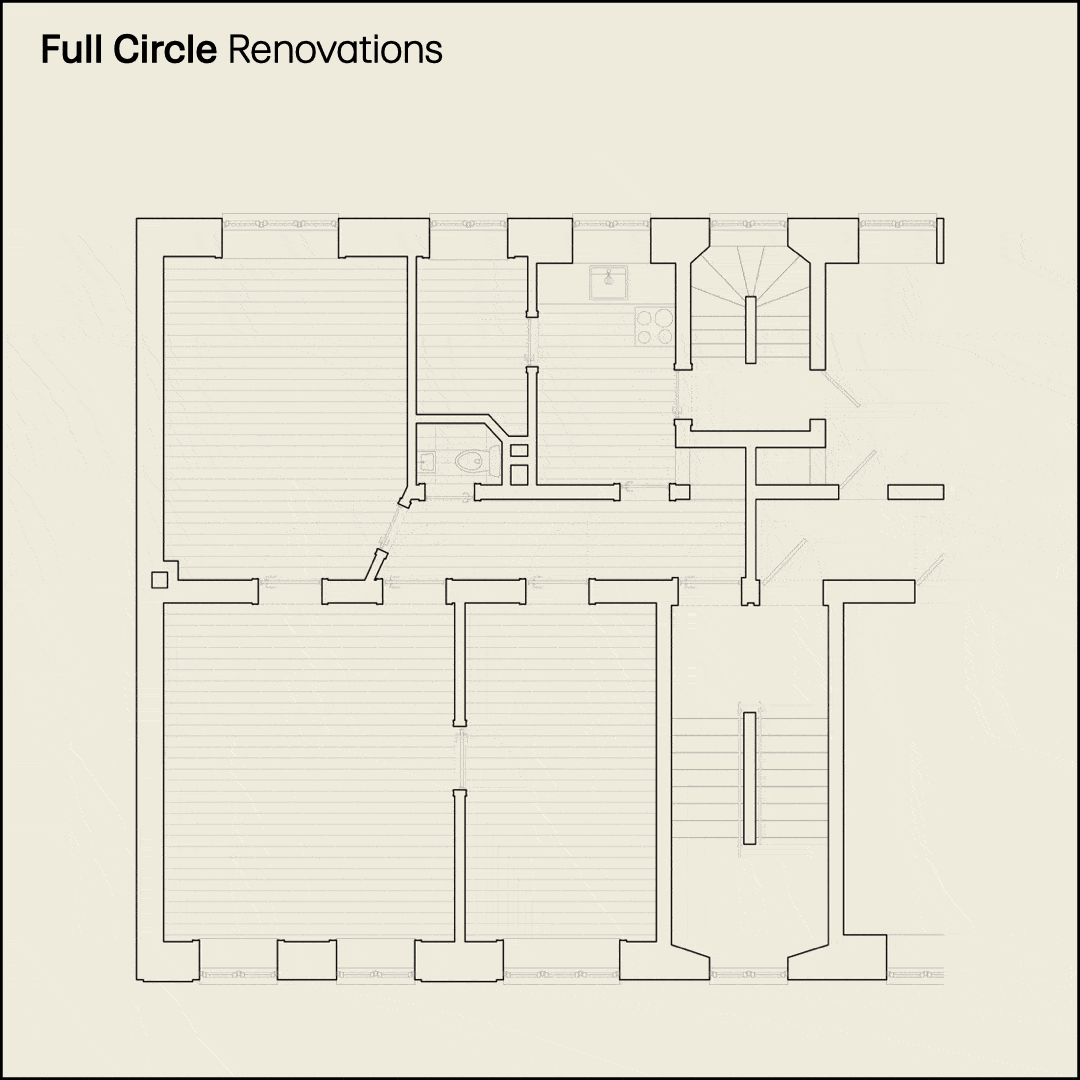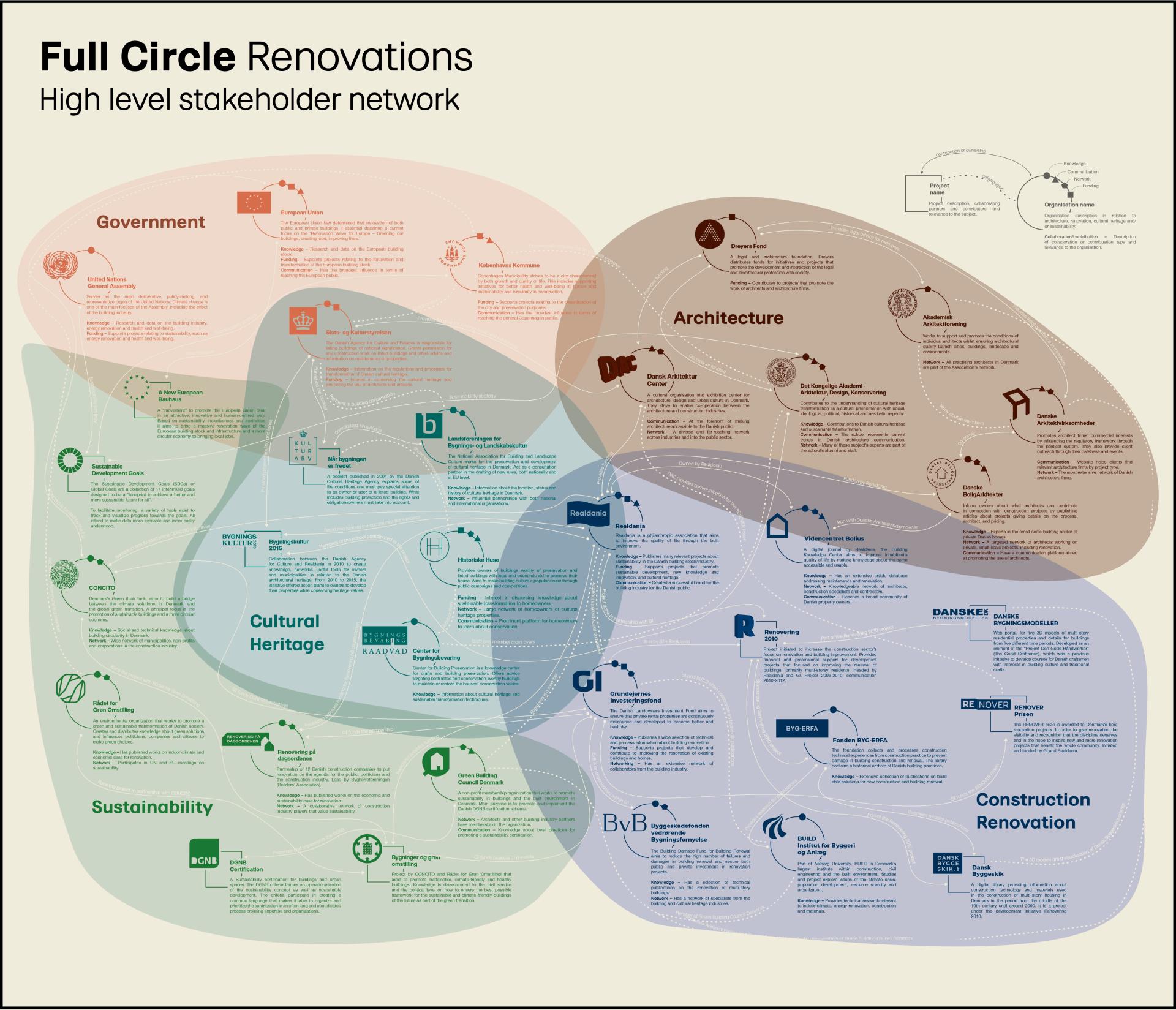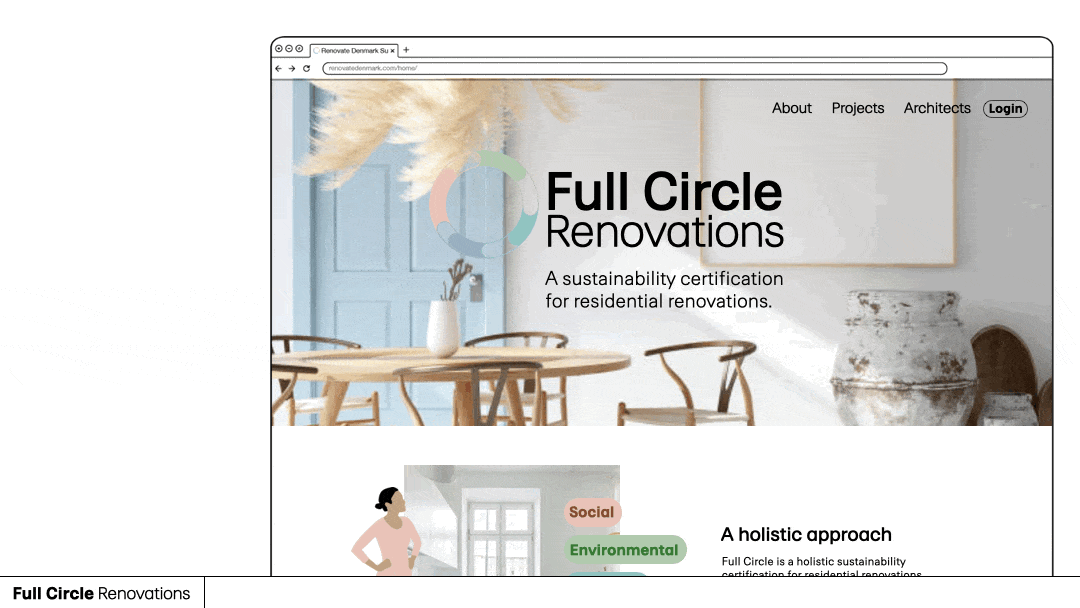Full Circle Renovations
Basic information
Project Title
Full project title
Category
Project Description
Only 15% of Danish homeowners consult architects when renovating their home. As a result, up to 80% use incorrect methods and materials – reducing sustainability, limiting accessibility and compromising the aesthetic integrity of their projects.
Full Circle Renovations is a digital sustainability certification and communication platform that builds public awareness and confidence in sustainable residential renovations. It connects architects, homeowners and contractors to promote best practices
Project Region
EU Programme or fund
Description of the project
Summary
Full Circle Renovation is a digital communication and collaboration platform aiming to increase architect-led, holistic, sustainable renovations of residential properties, including single-family homes, row houses and multi-story residential buildings in Denmark.
Denmark’s private residential renovation industry needs an overhaul. Studies of the renovated Danish building stock reveal that 60-80% of renovations use incorrect methods and materials1, causing billions of kroner in repairs costs for both owners and the state2. Currently, only 15% of Danish homeowners consult architects and specialists such as energy consultants when doing maintenance or renovations on their home3 - but could architects be the answer to increasing renovation quality and sustainability? Inspired by the European Commission’s Renovation Wave for Europe and New European Bauhaus initiative, Full Circle Renovation will provide a holistic sustainability certification and communication platform to assist architects, homeowners and contractors in making sustainable renovations.
Full Circle Renovation is
- A holistic sustainability certification helping architects and homeowners understand and ensure social, environmental, economic and cultural sustainability in residential renovations.
- A website to share knowledge about the certification as well as methods and materials to fulfil each sustainability category through case examples, expert resources and networking.
- A collaboration platform for architects, homeowners and contractors to ensure the renovation meets all sustainability categories from design to construction to assessment.
The project has taken the first steps to get community input and feedback through a public webinar hosted on 27 May 2021. Full Circle Renovation will collaborate with architects, homeowners, building industry experts and organisations to develop the certification and platform.
Key objectives for sustainability
Denmark is introducing new greenhouse gas emissions reduction thresholds to the Danish Building Code, making energy sustainability a requirement. However, these requirements are only energy focused. The Danish building stock has already seen widespread damage from energy renovations on cultural heritage and poorly designed spaces for inhabitants’ daily life.
By contrast, Full Circle Renovations uses four sustainability categories – Social, Environmental, Economic and Cultural – to ensure a holistic sustainability approach. Each category is divided into subcategories to provide measurable markers for each.
Social
Health – inhabitants’ physical health (ie. ventilation, daylight, heating)
Well-being – inhabitants’ mental well-being and spatial satisfaction
Functionality – spatial optimisation for inhabitants’ daily life
Social Responsibility – safe and ethical work environment practices throughout the project for inhabitants and workers
Environmental
Energy Consumption – i.e., CO2 emission reductions, insulating
Circularity – material reuse and recycling
Materials – sustainable and local sourcing
Biodiversity – co-evolution of the home and surrounding environment
Economic
Adaptability – design for disassembly or future additions
Return on Investment (ROI) – ensuring a higher market value
Life Cycle Costs (LCC) – reducing inhabitants' long term costs
Cultural
Heritage – surveying, protecting and strategically transforming the building’s historic qualities
Aesthetics – a considered approach to the quality of experience
Neighbourhood – aiming to contribute to the surrounding community or apartments
Certified Full Circle Renovation projects must meet a minimum threshold in each subcategory. Architects and homeowners will be encouraged to use the certification framework as a design tool. They will then use the Collaboration Platform to facilitate the assessment process and ensure that the project meets the criteria during all project phases.
Key objectives for aesthetics and quality
“Homes are important. They are places where we live, pray, suffer, laugh and cry … places where we always want to return and remember how it was.” Oscar Niemeyer
Respect for the building’s heritage
Even though most of Denmark’s residential building stock has cultural heritage value due to its unique and diverse typologies, most are not protected under any conservation regime.
By sharing knowledge about Denmark’s rich residential architecture history, Full Circle Renovations aims to show homeowners the beauty of their historic homes and choose to renovate rather than tear them down. Case examples will showcase renovations that modernise homes while conserving their cultural heritage value. Specific knowledge will be shared about materials and methods appropriate for the particular building typology –materials used for the renovation of a 1915 Neoclassical home might not be well suited in terms of energy consumption or aesthetics when renovating a 1960s mid-century modern structure
Showcasing architects’ unique aesthetic abilities
Unlike some other European Countries, Denmark does not require that renovation projects of a certain size or scope must be overseen by an architect. Mostly due to poor communication, homeowners have difficulty understanding what value an architect can bring to a renovation project. Instead, Danish homeowners often make renovations themselves or go directly to a contractor to perform maintenance tasks, leading to poor aesthetic continuity.
With their education and experience across social, cultural and visual arts, architects have a unique understanding of aesthetics and the ability to communicate their ideas through spatial design. Full Circle Renovations aims to showcase architects’ unique ability to provide a holistic overview, management skills, aesthetic and visual communications.
Key objectives for inclusion
Full Circle Renovations aims to create a common vocabulary and understanding of holistic sustainable renovation among architects, homeowners, and contractors. The certification and digital platform will make the assessment process transparent and facilitate a wide sharing of knowledge through case study examples, expert research, and a network of professionals and businesses.
Using a co-creation strategy throughout the project development phases, Full Circle Renovations will gather input and feedback from a wide range of stakeholders.
During the Define phase of the project, interviews were conducted with architects, homeowners, contractors, and building industry organisations such as to understand barriers for sustainable residential renovation.
In the Design phase of the project, a series of public webinars are conducted to gauge interest and gather feedback. In the first iteration held on May 27th with funding from Grundejernes Investeringsfond (Landowners’ Investment Fund), following the project presentation, there were reaction presentations from an expert panel made up of researchers in architectural sustainability. The webinar gathered the interest of over 1600 people across stakeholder groups from over 50 countries. Garnering very positive feedback, a second iteration, this time using a workshop format, is being planned in the coming weeks focusing on homeowners with Danske BoligArkitekter (Association of Residential Architects).
The certification criteria will be detailed during the Develop phase by project groups of experts from each category drawing on different backgrounds and industries. Each group will include:
- 3 experts (researchers, academics, industrial experts)
- A residential architect
- A communications expert
- A Full Circle representative
The project groups will meet in a series of workshops to develop and define the criteria and assessment methods.
In the Launch and Refine phases user tests of all stakeholder groups will take place.
Innovative character
The Full Circle Renovations certification is unique in its focus on architect-led residential renovations and digital collaboration platform.
A focused and holistic certification
Studies show that certified sustainable buildings outperform conventional buildings on environmental, economic and social parameters. Not surprisingly, industry and public interest in sustainability certification has increased. However, most certifications are not suited for the private residential market for several reasons.
- Usually are for new-build projects
- Price is too high for small-budget projects
- Most focus on energy, not holistic criteria
- Some take many resources for architects to learn and implement them
- Often too technical for homeowners to understand
- Usually applied retroactively
The Full Circle Renovations certification framework helps inform sustainability decisions throughout all project phases. It uses a communication strategy that is straightforward, visually engaging, and demonstrates the value of architects to renovation projects. Using a base of expert knowledge and clear assessment criteria, it helps architects ensure they are making a sustainable renovation for their clients and streamline the process through the collaboration platform.
Collaboration platform
The collaboration platform will help architects, homeowners and contractors track sustainability throughout the project and submit documentation for the certification assessment.
The basic freemium platform will ensure that for each project
- A survey of the existing property is conducted
- Each sustainability criterion is considered in the design phase
- Sustainability decisions are executed during construction
- The certification assessment is made with a defined set of documentation
A “pro” subscription-based version of the platform will give additional access to project management tools such as scheduling and budgeting and communication networks for stakeholders to use.




